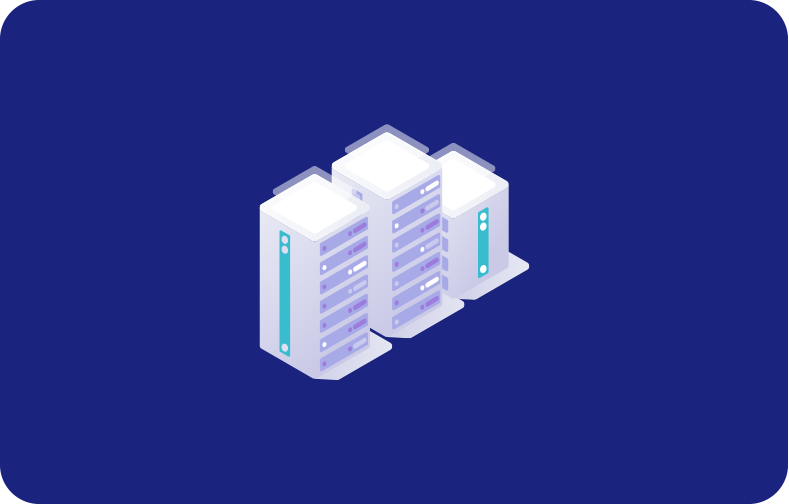Dedicated VPS

In the modern digital landscape, a reliable and efficient hosting solution is the backbone of a robust online presence. Dedicated servers are the closest to a top-tier choice in hosting services, used by both companies and individuals who seek the best possible performance, security, and control.
The dedicated server will, however, allocate the complete suite of resources to one client, thereby providing higher performance levels and a higher degree of customization and scalability through its exclusive allocation. This is in stark contrast with shared hosting environments, whereby the available resources are shared with multiple users.
-
- What is a server?
- Dedicated server vs. virtual private server
- What is the difference between a dedicated server and a VPS?
- Differences Factor: Dedicated server vs VPS
- Summary of the difference: dedicated server vs vps
- VPS or Dedicated server: which server to use for your needs
- VPSserver is all that your server needs.
Dedicated Servers are physical server machines that are entirely assigned to a single user or organization. They offer full hardware capabilities, such as CPU, memory, and storage, without sharing them with other users. This setup is ideal for top-rated websites, large-scale e-commerce platforms, and applications dealing with high volumes of data and requiring reliable, consistent performance that puts you in control over your digital operations.
In this write-up, the target is to provide a complete knowledge of Dedicated Servers, their working, unique advantages, and how to select the correct server for specific needs.
Whether you are a true games fan in need of simplified gaming time, a business able and willing to host complex web applications, or a service provider that must ensure stable and absolutely secure hosting, understanding all those subtleties about dedicated servers will lead you to a well-informed decision based on your technical needs, which will surely help build confidence in your decision-making.
Let's take a look behind the scenes at dedicated servers, compare them with other hosting solutions, such as VPS, and unlock your power to survive and thrive in the digital world. By the time the discussion is over, you should have understood the basic concepts and would appreciate it if a dedicated server were the best option for your hosting needs.

What is a server?
The explanation of web hosting is just the explanation of what a server is. A server is a powerful computer that provides service and resources to other computers across the network. It refers to the process of hosting web servers so as to enable the websites to be reached over the Internet. The former is physical, i.e., a whole machine given over to hosting websites. At the same time, the latter is the virtual server, a partitioned portion of a physical server simulating the functions of the actual physical server.
Dedicated server
The dedicated server is the top-of-the-line hosting solution, where you have all the available resources of the physical server without sharing them with anyone. This type of hosting deploys the whole physical hardware, operating system, and software environment under organizational control; it is, therefore, meant for high-traffic websites, large-scale e-commerce platforms, and businesses requiring advanced security and highly scalable resources.
Dedicated hosting takes care of the maintenance and management of not only the physical server but also ensures that business operations can run smoothly through dedicated resources, removing the risk of shared hosting environments that run in resource concurrency between many users on the same server.
VPS
On the other hand, Virtual Private Servers offer a more budget-friendly option while still providing most of the features of dedicated servers. In VPS, a single physical server is divided into several servers, each running its own independent system.
This 'virtual' computer approach ensures you have a dedicated set of resources for your needs, including CPU and RAM, all at a more affordable price. VPS solutions are, therefore, an excellent fit for small and medium businesses that require more resources than shared hosting can offer but don't need the total capacity of a dedicated server.
Many VPS hosting providers also offer managed VPS hosting, simplifying the hosting experience with server environment upkeep, security updates, and technical support.
Dedicated server vs. virtual private server
They can all seem quite overwhelming, especially when choosing between a dedicated server and a virtual private server. Both have unique benefits and are mainly concerned with hosting needs relating to traffic volume, security needs, and budget constraints. In this detailed comparison, we will try to make clear the features and benefits of these two hosting models, which have gained significant popularity, and guide you through that to finally make an informed decision about which fits best within your technical and operational requirements.
How a dedicated server works
The dedicated server offers an exclusive hosting environment. You lease a complete server with all resources available. Such exclusivity comes with enormous benefits for performance, security, and reliability. The following dedicated server offers the best combination for applications that require high resource availability and stability.
This means that this will come in handy, especially to those businesses running complex databases or large e-commerce sites or those that handle sensitive transactions where the security of the server is paramount. The dedicated server has a physical server, giving total control of the server environment. This control comprises customization of the hardware configurations, specifications of the operating system, and complete security implementations.
Besides, there is no sharing of the server with any other users; therefore, the risk brought by such shared resources, for instance, susceptibility to security threats from other server tenants, is significantly mitigated.

How a virtual private server works
In contrast, a Virtual Private Server (VPS) provides a virtualized hosting solution. While a dedicated server offers the physical allocation of resources, a VPS uses software to partition a single physical server into multiple "virtual" servers. Each VPS operates independently and seemingly as its dedicated server, which is why VPS hosting is often considered a middle ground between shared hosting and dedicated hosting.
Each virtual server can run its full-fledged operating system and can be independently rebooted. A key feature of VPS hosting is its scalability—resources can be adjusted based on the business's specific needs, which is invaluable for growing companies that might need more resources periodically but do not yet require (or cannot afford) a dedicated server.
The use of a hypervisor for resource management ensures that the virtual machines have allocated resources that help prevent downtime and performance degradation due to other VPS users on the same physical server. While VPS provides better security than shared hosting, it's usually not complete isolation compared to the dedicated server. This is because of the shared underlying physical hardware.

What is the difference between a dedicated server and a VPS?
The world of web hosting does have some seemingly complex choices to make. From a Dedicated Server to a Virtual Private Server, having the correct form of server can make a huge difference about the performance and the scalability of your digital operations. Dedicated servers and VPSs both offer unique advantages across various applications, from gaming and web to trading and streaming. Understanding these differences is crucial in selecting the optimal hosting environment for your specific requirements.
For gaming
Gaming platforms have diverse hosting needs depending on the nature of the game and the expected user load. A VPS hosting might be sufficient for hosting small-scale games with few players due to its affordability and adequacy in handling moderate loads. VPS environments, particularly cloud VPS hosting, offer enough space and resources while providing essential protection against common security threats.
However, for hosting larger game servers, organizing esports events, or managing high-traffic gaming platforms, a dedicated server proves superior. It provides not only more resources and better performance but also advanced security features like specialized anti-DDoS protection tailored for gaming, ensuring a lag-free and secure experience for all users.
For web hosting
For small and medium businesses, choosing between VPS hosting and dedicated hosting often hinges on the size and traffic demands of the website. VPS solutions offer a middle ground with access to dedicated resources on a shared physical server, which can be an affordable package for many startups. However, websites with high traffic or those handling sensitive transactions might require the robust capabilities of a dedicated server. Such servers offer complete control over the hardware configurations, allowing for highly scalable and secure hosting plans that ensure optimal performance even during peak traffic.
For trading
The trading industry, especially in areas involving forex or stock trading platforms, demands high uptime and quick response times. A Forex VPS is usually sufficient for traders utilizing automated trading systems, offering fast connectivity and ample processing power to manage trades efficiently. However, for more sophisticated trading operations that employ complex algorithms or machine learning to forecast market trends, the formidable processing capabilities and capacity to manage large data sets without compromising performance make a dedicated server the superior option.
For streaming
Streaming media and content delivery require substantial bandwidth and a high level of server availability to provide a smooth viewing experience. Here, dedicated servers are often the preferred choice because they offer the entire server's resources to manage high streaming demands effectively. This ensures that streaming services can deliver high-quality content with minimal buffering and downtime, a critical requirement for media-heavy applications.
For mobile and internet applications
The choice between a VPS and a dedicated server for hosting mobile and web applications depends mainly on the application's resource requirements and scale. A VPS might suffice for applications with moderate user bases and data processing needs, providing a cost-effective yet scalable environment. However, for larger applications requiring extensive processing power or when user data security is paramount, opting for a dedicated server ensures that the application has access to dedicated resources and advanced security measures, thus delivering a better user experience and enhanced operational security.
These distinctions underscore the importance of carefully considering your hosting needs against the backdrop of your specific application requirements. Whether opting for VPS or dedicated hosting solutions, the choice should align with your operational demands, budget constraints, and long-term business goals, ensuring that your hosting environment robustly supports your digital presence.
Differences Factor: Dedicated server vs VPS
With that in mind, it is crucial to differentiate between the subtleties of dedicated servers and Virtual Private Servers as you navigate through the dense hosting solutions. Each hosting environment has its merits and is most apt to a particular need regarding security, performance, flexibility, scalability, and cost. By understanding these key considerations and gathering insights from across the spectrum of hosting services, you can feel informed and knowledgeable about your web hosting strategy.
Safety
In the field of server security, though both dedicated servers and VPSs are considered good security, they serve different levels of protection. A dedicated server offers an isolated environment since it doesn't share its physical hardware with any other user.
The dedicated server's exclusivity makes it an extraordinary choice for high-security needs and often enforces regulatory compliance. Though VPS hosting ensures high security, there is a problem: Some virtual machines share the same physical server and can, therefore, bring weakness if not taken care of.
However, most of these security threats can be mitigated effectively by using advanced security measures and adequately managing them by the VPS hosting providers.
Performances
Performance is a critical factor when choosing between dedicated hosting and VPS hosting. Dedicated servers provide the best performance for websites or applications with high traffic that substantially consumes resources because all server resources are fully allocated to a single user.
Derived from that, it offers proprietary technology that allows exclusive access to physical resources such as disk space and operating systems, allowing for faster processing and higher uptime. At the same time, VPS share the underlying physical server but are designed to mirror the performance of a dedicated environment using virtualization technology.
Nevertheless, since VPS can handle moderate traffic well, it will still exhibit some limits in traffic conditions when the demand exceeds the resources set by the server environment.
Flexibility and Scalability
Flexibility in hosting environments involves how easily users can modify and manage server resources. Dedicated servers allow for a level of control and customization since they facilitate full access to the configuration of hardware or software installation in a manner that suits the individual user.
On the contrary, scaling in the dedicated server is done on a physical server, where it's time-consuming and costly. VPS hosting offers much flexibility since scaling of the virtual machines happens quickly based on the user's demands. Upgrading a VPS is often as easy as changing the service package and can make scaling much more possible than traditional dedicated hosting.
Cost
Pricing is, hence, compassionate in the choice between a dedicated server or VPS hosting. While a dedicated server offers more robust performance and total control but brings higher costs, the market would need to be bigger for businesses or compliance requirements. On the other hand, VPS hosting offers a cheaper package while giving most of the benefits of a dedicated server, but at only a fraction of the cost.
These make VPS a perfect choice for SMEs that require efficient hosting without expenditure over full-scale dedicated resources. All of these options, hosting on a dedicated server and VPS, have their place in digital ecosystems. They cater to the needs of their intended users by presenting unique features and limitations. This will put you in a better position to decide the best hosting solution that considers your precise requirements relating to the needed security level, performance, flexibility, scalability, and cost.

If you need a high-performance and complete control server, choose a dedicated one; in other cases, you can benefit from VPS because it's flexible and scalable.
A virtual private server represents a more affordable package while still providing many of the same benefits as a dedicated server. In VPS hosting, a single physical server is partitioned into multiple servers using virtualization technology managed by a hypervisor. This software layer not only creates but also manages these virtual machines, allocating what appears as dedicated resources to each.
However, these resources—such as storage, CPU time, and RAM—are still shared on the same server among many users. Each VPS operates independently of the others, providing better security than shared hosting but less than a fully dedicated server environment. VPS hosting is highly scalable, allowing for easy resource adjustments according to your needs and making it suitable for businesses experiencing growth spurts. This affordability and scalability should reassure you about your financial and growth plans.
Summary of the difference: dedicated server vs vps
Notably, a distinct difference between the most critical dedicated servers and the virtual private server (VPS) is evident in hosting solutions. Two best-seller options with unique benefits in performance, security, scalability, cost, resource allocation, and customizability appeal to different needs: for SMEs or high-traffic websites.
Security
Security thus becomes a critical concern in any hosting environment. A dedicated server would enhance businesses' security features since firms can implement full security controls that would have been impossible in a shared hosting environment. Thus, a dedicated server provides complete control over the actual server, making it easier to enforce more rigorous security policies and the required complexities by compliance.
On the other side, a VPS also supports a robust security setup; however, it shares the same physical server with other virtual machines and, hence, could introduce vulnerabilities and limit deployability in some security measures. However, in most instances where the provider offers both dedicated and VPS hosting, high security is claimed. A dedicated server is always better because it is isolated.
Performance
There is still a significant factor that dedicated servers usually beat VPSs by a long shot: performance. With dedicated hosting providing the whole usage of the physical server and even access to all the resources from it, high-demanding applications will run at their total capacity without any chance of other users using resources from the system.
This would bring about excellent performance and is the best fit for websites or applications that consume CPU and RAM. VPS, on the other hand, hosts many users on the same server but in a separate virtual environment. Modern VPS solutions, providing the capacity of performance to satisfy significant parts of the demands, are usually more convenient in smaller-scale operations compared to the high capabilities of dedicated servers.

Scalability and Cost
Scalability in dedicated hosting involves physically adding more resources or servers, which can be time-consuming and costly. However, it provides the benefit of dedicated resources tailored for high-growth and resource-intensive scenarios.
VPS hosting, meanwhile, offers highly scalable options that are easier and faster to upgrade, thanks to its virtual nature. This makes VPS a more flexible and often more affordable package for businesses in the growth phase that need to scale resources dynamically.
Resource allocation and customizability
Resource allocation and customizability are where dedicated and virtual servers significantly diverge. Dedicated hosting offers complete access to a server's resources, allowing for customization at a granular level—from the operating system installed to the hardware configurations and software customizations. This is ideal for specific enterprise needs that require unique setups. VPS hosting, while providing a good level of customizability, does so within the constraints of a shared physical infrastructure. It allocates a set portion of the server's resources to each user and typically allows for significant, but not complete, control over the computing environment.

VPS or Dedicated server: which server to use for your needs
Those who have to choose between a dedicated server and a Virtual Private Server (VPS) need to understand these key features and fully understand how they apply to their business. The physical server is dedicated and whole and is often recommended for its excellent performance qualities. This type of hosting provides all the server's resources to one client, making it ideal for high-traffic websites or applications that demand a high level of data security and resource-intensive workloads such as heavy data processing.
Exclusive access to hardware configurations enhances performance and ensures advanced security, which is particularly important for businesses handling sensitive data under strict regulatory requirements.
On the other side, VPS hosting is a cheaper and more flexible way, while it is a division of one physical server into several virtual ones. Each VPS operates independently with its dedicated resources, such as disk space and operating system, shared from the same server. This setup is perfect for SMEs that need a cost-effective yet flexible hosting environment.
VPS solutions can efficiently handle moderate traffic and are highly scalable, allowing businesses to adjust resources as their needs grow. The ability to create virtual machines within the same server provides a versatile platform for hosting web applications, launching business software, or setting up test environments.

While both hosting solutions provide valuable benefits, the choice between a dedicated server and a VPS should consider several factors. For businesses requiring absolute control over their hosting environment with no compromise on server resources, dedicated hosting plans are paramount. These dedicated hosting plans ensure dedicated resources with full access and isolation of every security threat from any other user on the same server.
VPS hosting, on the other hand, provides a good compromise between cost and capability. This provides a dedicated environment on a shared server, is relatively cheap, and combines all the benefits of shared and dedicated hosting.
Grasping the critical differences between dedicated and VPS hosting is paramount in choosing the right hosting for your business. It would be straightforward to forget that the choice between the raw power and security of dedicated servers and the flexibility and affordability of VPS hosting could have significant consequences for your business's VPS environment and growth curve.
All of these should be considered based on each server's specific needs and capabilities so that one is in a position to make a knowledgeable decision based on what is needed now and in the future.

VPSserver is all that your server needs.
Dedicated hosting blends the affordability of shared hosting with the power of dedicated servers, offering the perfect solution for SMEs with high traffic demands. It operates on a single physical server, yet each virtual machine maintains its dedicated resources and operates with complete autonomy. This setup provides the dual benefits of enhanced security and complete control over resources, akin to a dedicated server environment but at a more accessible price point.
VPSserver is distinguished by its ability to scale seamlessly. Using advanced hardware configurations like 2.7 GHz Intel Xeon Skylake processors and NvME SSDs, VPSserver guarantees high performance and low latency across its global data centers. The integration of KVM virtualization technology ensures that each virtual machine operates securely and independently while unlimited IOPS capabilities effectively support high-performance requirements.
VPSserver excels with its robust infrastructure, which is capable of accommodating rapid traffic growth and is complemented by 24/7 expert support. This class technology, combined with support, VPSserver, is the best-suited choice for businesses requiring dedicated hosting. The VPS provides benefits like a dedicated environment combined with cloud-based hosting integral to an easily scalable, well-protected, cost-effective online presence.
Frequently Asked Questions
How does a Dedicated Server benefit my business, and what do I stand to gain from it?
A dedicated server is an entire physical machine that provides all the server resources without sharing them, from CPU to memory and storage space. In other words, it is a hosting service tuned ideally to keep running your busy websites, full-sized e-commerce platforms, and demanding applications at secure performance and control quality. It offers the perfect level of customizability and scalability to businesses that may need an isolated environment for very secure or regulatory data.
Virtual Private Server vs. Dedicated Server: Key Differences?
A VPS is distinct from a dedicated server in that the latter provides all of its resources to a single client, using an entire physical server exclusively. However, it comes with many virtual environments hosted by a single physical server. Each VPS operates independently with its own set of resources, like disk space and RAM, allocated from the same server, providing a balance between cost and performance. This makes VPS a very convenient option for small to medium businesses that need more resources than shared hosting can give but do not require the total capacity of a dedicated server.
Can I scale my hosting resources with a VPS?
One of the core benefits of a VPS is the ability to scale your resources, CPU time, RAM, and storage to suit your business's needs better. Virtualization technology enables this flexibility, where quick scaling up or down becomes possible. This makes VPS a viable option for growing businesses that experience variable traffic and need a hosting solution that will readily bend according to the increased business requirements.
What security benefits come with the use of a dedicated server?
A dedicated server provides a higher level of security than others since it does not share the physical hardware. Such isolation helps keep out some of the vulnerabilities that come from other tenants, such as cross-contamination and DDoS attacks. Businesses can further facilitate strong security settings, customizing firewall options, and other ways to protect their data more firmly and comply with compliance requirements.
Is VPS hosting more affordable than dedicated server hosting?
Yes, that is true; VPS hosting generally enables customers to draw most of the benefits of a dedicated server but only at a fraction of the cost. It is practically a cost-effective option for businesses needing better performance and security than shared hosting can afford—in other words, "virtual private servers"—when you have neither the budget nor desire to part with the full capabilities of a dedicated server.
What would be the reason I should go for a dedicated server, not a VPS?
Go for the dedicated server if your business requires a peak level of performance, security, and availability of resources. It can also be recommended for large-scale applications, heavy-traffic websites, and operations that require a vast potential for processing data. Should your needs be less intensive, a VPS provides a middle ground that accommodates the balance of performance, security, and cost-effectiveness.











